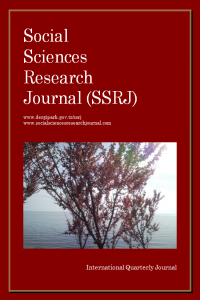The Association between Corruption and Globalization in African Countries
Corruption, Economic Globalization, Social Globalization, Poltical Globalization, Panel Data, African Countries
The Association between Corruption and Globalization in African Countries
Corruption, Economic Globalization, Social Globalization, Political Globalization, Panel Data, African Countries,
___
- Akinpelu, S., Ogunseye, U., Bada, I. S., & Agbeyangi, A. (2013). The socio-economic determinants of corruption in Nigeria. European Journal of Humanities and Social Sciences, 19(1), 1-17.
- Al-Sadig, A. (2009). The effects of corruption on FDI inflows. Cato J., 29, 267.
- Asiedu, E., & Freeman, J. (2009). The effect of corruption on investment growth: Evidence from firms in Latin America, Sub‐Saharan Africa, and transition countries. Review of Development Economics, 13(2), 200-214.
- Asongu, S. A. (2013). Fighting corruption in Africa: do existing corruption-control levels matter?. International Journal of Development Issues, 12(1), 36-52. Bardhan, P. (1997). Corruption and development: a review of issues. Journal of economic literature, 35(3), 1320-1346.
- d'Agostino, G., Dunne, J. P., & Pieroni, L. (2016). Corruption and growth in Africa. European Journal of Political Economy, 43, 71-88.
- De, U. K. (2014). Globalisation and cointegration among the states and convergence across the continents: a panel data analysis. Economic Analysis and Policy, 44(1), 107-121.
- Erdogan, M., & Unver, M. (2015). Determinants of foreign direct investments: Dynamic panel data evidence. International Journal of Economics and Finance, 7(5), 82.
- Gillanders, R. (2014). Corruption and Infrastructure at the Country and Regional Level. Journal of Development Studies, 50(6), 803-819.
- Huang, C. J. (2016). Is corruption bad for economic growth? Evidence from Asia-Pacific countries. The North American Journal of Economics and Finance, 35, 247-256.
- Huntington, S. P. (1968). Political order in changing societies. Yale University Press.
- Koyuncu, C., & Bhattacharyya, G. (2007). Predicting Corrupt Practices in the Public Sector for 23 Oecd Countries. Applied Econometrics and International Development, 7(1), 15-36.
- Koyuncu, C., Ozturkler, H., & Yilmaz, R. (2010). Privatization and corruption in transition economies: a panel study. Journal of Economic Policy Reform, 13(3), 277-284.
- Koyuncu, C., & Yilmaz, R. (2009). The impact of corruption on deforestation: a cross-country evidence. The Journal of Developing Areas, 42(2), 213-222.
- Koyuncu, C., & Yilmaz, R. (2013). Deforestation, corruption, and private ownership in the forest sector. Quality & Quantity, 47(1), 227-236.
- Kunieda, T., Okada, K., & Shibata, A. (2014). Corruption, capital account liberalization, and economic growth: Theory and evidence. International Economics, 139, 80-108.
- Lalountas, D. A., Manolas, G. A., & Vavouras, I. S. (2011). Corruption, globalization and development: How are these three phenomena related?. Journal of Policy Modeling, 33(4), 636-648.
- Leff, N. H. (1964). Economic development through bureaucratic corruption. American behavioral scientist, 8(3), 8-14.
- Lien D, 1990, “Corruption and Allocative Efficiency” Journal of Development Economics, 33, 153- 164.
- Lui, F. T. (1985). An equilibrium queuing model of bribery. Journal of political economy, 93(4), 760-781.
- Mauro, M. P. (1996). The Effects of Corruptionon Growth, Investment, and Government Expenditure (No. 96-98). International Monetary Fund.
- Mo, P. H. (2001). Corruption and economic growth. Journal of comparative economics, 29(1), 66-79.
- Nissanke, M., & Thorbecke, E. (2006). Channels and policy debate in the globalization–inequality–poverty nexus. World development, 34(8), 1338-1360.
- Paul, B. P. (2010). Does corruption foster growth in Bangladesh?. International Journal of Development Issues, 9(3), 246-262.
- Serra, D. (2006). Empirical determinants of corruption: A sensitivity analysis. Public Choice, 126(1), 225-256.
- Timmons, J. F., & Garfias, F. (2015). Revealed corruption, taxation, and fiscal accountability: Evidence from Brazil. World Development, 70, 13-27.
- Topal, Mehmet Hanefi, and Mustafa Unver. "Yolsuzluğun Belirleyicileri: Kırılgan Ekonomiler İçin Panel Eş-bütünleşme Analizi." Balkan ve Yakın Doğu Sosyal Bilimler Dergisi 2, no. 2 (2016): 58-68.
- Unver, M., & Erdogan, M. (2015). Social effects of foreign direct investments: International empirical evidences for education, health and social security. International Research Journal of Finance and Economics, 132, 7-19.
- Unver, M., & Koyuncu, J. Y. (2016). The Impact of Poverty on Corruption. Journal of Economics Library, 3(4), 632. Wade, R. H. (2004). Is globalization reducing poverty and inequality?. World development, 32(4), 567-589.
- Warner, C. (2008). Globalization and Corruption. In the Blackwell Companion to Globalization. Blackwell Publishing Ltd., 593-609.
- Wu, S., Li, B., Nie, Q., & Chen, C. (2017). Government Expenditure, Corruption and Total Factor Productivity. Journal of Cleaner Production.
- Yayın Aralığı: Yılda 4 Sayı
- Yayıncı: Denta Florya ADSM Limited Company
The Association between Corruption and Globalization in African Countries
Julide Yalçınkaya KOYUNCU, Mustafa ÜNVER
M.Ömer AZABAĞAOĞLU, Celal Demirkol
Küresel Kriz Sonrası Türkiye’de Uygulanan Ekonomi Politikaları
THE EFFECTS OF STRATEGIC MANAGEMENT PRACTICES AND RISK PERCEPTION ON COMPETITIVE ADVANTAGE
Hasan CİNNİOĞLU, Hamide SALHA, Hasibe YAZIT
Sinema İkonografisinde Kostüm ve Makyaj
Trakya Bölgesinde Girişimcilik Ekosistemi ve Eğitimi
HÂRİCÎLERDE İDEOLOJİK FARKLILAŞMA ÖRNEĞİ: ACÂRİDE FIRKASI DOĞUŞU, GÖRÜŞLERİ VE YAYILIŞI
